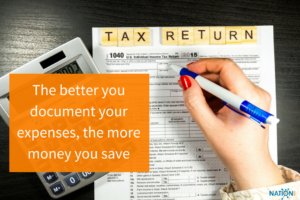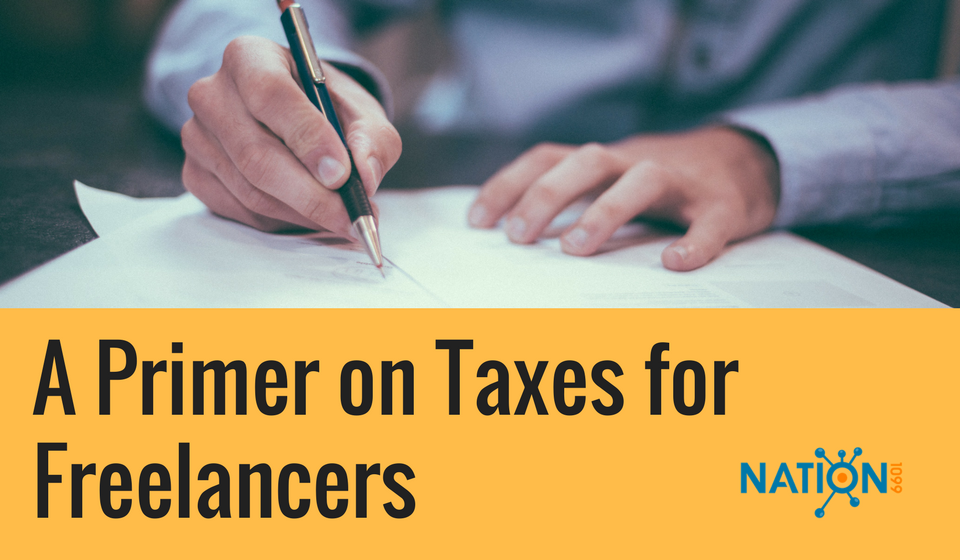As freelancers and consultants, we handle our business operations largely on our own, and tax filing for many of us is no exception. Independent contractor tax deductions are not especially thrilling topics, but understanding how freelance taxes are different from traditional employment is key to mastering the self-employed lifestyle.
This guide helps new and veteran independent contractors manage their freelances taxes and to avoid the pitfalls of the tax preparation process.
Whether you’re planning to file your freelance taxes on your own or work with a tax professional (which we highly recommend), the points below will give you a basic understanding of your obligations and how to handle them.
Two caveats before we start:
- This information is about freelance taxes in the U.S. Let us know if you have insight on how freelancers are taxed in other countries.
- This isn’t expert advice about your personal situation. Consult actual experts before making any big decisions.
Related reading: Manage Your Freelance Finances Like a Thriving Artist
By the way, if you’re coming across this article at the last minute during tax season, we want to let you know that TaxAct, a software designed especially for the self employed and small businesses, has a special offer. Switch to TaxAct to file your federal & state returns for just $5 each! (Valid for new customers only)
And if you don’t see that deal because it’s seasonal — or because you’re a returning customer — this 20% off deal at TaxAct should work for you.
Freelance taxes vs. employee taxes
If you’ve recently transitioned from the standard W-2 employment, one of the most immediate changes you will notice in your freelance tax responsibilities is that you now have what the IRS calls the “self-employment tax.”
The self-employment tax is the share of social security and medicare taxes that your employer would have covered in a traditional W-2 job. As a freelancer, you are essentially both the employee and the employer, so you have to cover both pieces.
That means that the 7.65% that would have been your share to pay will now doubled to 15.3%.
And that’s before you get to the personal income tax you will owe.

Did this come as a rude awakening? Then look critically at your freelance pricing structure going forward. Most freelancers start out by setting their freelance rates way too low.
From the get-go your project/hourly rate needs to be about 30 percent higher than it would have been in a traditional work setting to compensate for the added tax burden you now face as an independent contractor.
If you set your rates by using your old salary or hourly wage as the foundation, you are automatically going to be behind at the end of the year when you settle up with the IRS. So your freelance rates need to account for your freelance taxes.
For tips on securing this higher figure, check out our post on negotiating freelance rates.
Freelancers have to pay quarterly estimated taxes
When do you pay all these taxes as an independent contractor anyway? As a W-2 employee, your employer is withholding taxes from your paycheck. Actually, they’re withholding an estimate of what you owe. That’s why sometimes you write a check after you complete your annual tax return and why sometimes you get a refund. The estimate was slightly off.
But you’ve still been paying some payroll and income taxes all along the way.
However, as a freelancer, you have no paychecks. You have invoices. And the client isn’t withholding any taxes from that.
You see how this is headed toward a problem if you’re not careful? If you “take home” all of the invoice — cashing the check and spending it all — you won’t have enough to pay your freelance taxes.
What’s more, the IRS doesn’t want to wait until April 15 to get all of it. They want you paying up on a regular basis.
So the IRS requires freelancers have to pay what’s called quarterly estimated taxes. See the table below about when the quarters are, and note that the last quarterly payment of a given year is actually made in January of the following year.
Quarterly estimated taxes are how independent contractors give the IRS a steady stream of tax revenue, as standard employers would account for, again, via employee withholdings.
There are complicated rules for calculating your estimated tax, which your accountant can help you with. And so can a good bookkeeping and invoicing software like FreshBooks.
You can check out our toolkit page for other accounting software options of freelancers.
Every year when you complete your tax return for the previous year, your accountant or your software calculates a new quarterly estimate for the current year.
But in the first year of business as a freelancer you may not have this organized yet. A simple rule of thumb is to add up your actual invoices in the current quarter, subtract your actual expenses to get your net and then calculate 30 percent of that.
That’s what you send to the IRS, and pray that it’s too much and you’ll get a big refund later.
Or you can use the IRS worksheets for estimating your quarterly freelance taxes.
You submit these payments via the 1040 form.
Resist the temptation to ignore your estimated quarterly taxes so you can deal with it all at once next April. The IRS can penalize freelancers for not making the estimated quarterly tax payments.
In fact, according to recent reports, the IRS penalized 10 million tax filers for underpayment in 2015. Ouch. Even worse, the penalty has increased from three percent of what was owed to four percent.
Ouch.
Again, a decent tax software can help you out with that. We’ve been paying attention to how TaxAct develops its product especially for freelancers. I hope someone tries out the free version and let’s us know in the comments what they think of it.
You can dodge the underpayment penalty if: you owe less than $1000 in taxes from your freelance work (excluding withholdings and estimated tax payments) or have paid 90 percent of what you owe for the current calendar year, or 100 percent of what you owed on the prior year’s tax return (whichever is smaller).
So once your freelance business is up and running, it becomes simpler to meet the estimated tax requirement. You can just pay one fourth of the total tax owed the previous year. If your business grows, you’ll owe a big make up payment. If your business declines, you’ll get a refund.
Pro tip: Make doubly sure that you get your first estimated tax payment in on tax day (April 18)! This will get you on track for 2017 and minimize the chances of you paying the four percent penalty for the last year.
Rigorously track your freelance income & expenses
Don’t count on your clients to handle this or prompt you to pay your taxes. Technically, they are supposed to report payments that they have made to you above a certain amount. $600 was the threshold in recent years. And they are supposed to do that before January 31.
What form do your clients report payments to you on? The 1099, of course! That’s where our name comes from. That’s why you are called a 1099 worker instead of a W-2 worker. Your clients aren’t going to send you a W-2 at the end of the year like they give to employees.
However, clients aren’t always as prompt or rigorous with their 1099 reporting as they are with W-2s with employees. So, whether or not you ever get all your 1099s from the clients who owe them to you, you need to report all your income to the IRS.
The easiest thing to do is to keep an account of every payment you receive by the source of that payment and regardless of whether or not any client pays you more than $600 in a year. Again, a basic bookkeeping software like Freshbooks helps a lot here.
Independent contractor tax deductions
Your freelance business has a very special power. It can turn most things that it touches into a tax deduction. Pretty cool trick, huh? Let’s see how many independent contractor tax deductions are available to you.
Freelance businesses may not have all of the same expenses as their small business and corporate peers. However, you still need your workspace to serve the core functions of an office.
Things like:
• Office supplies
• Furniture
• Computers
• Software
• Telephones/Internet
• A coffee machine
• The approximated electricity used to power your work space*
• Rent*
*These items are contingent upon you sufficiently proving that you have a space in your house or apartment that is dedicated solely to work-related activities. The multipurpose “dining room office” may not count!
And then there are all the expenses you incur when you leave the office:
- Cab rides
- Ride share app expenses
- Meals and coffee for client meetings
- Conference fees
- Travel to conferences
Other deductible expenses for independent contractors include the cost of reaching out for more business:
- Marketing and advertising
- Website hosting
- Domain name
Another deductible expenses is the cost of actually doing the work, which often includes paying subcontractors if your freelance business is growing and thriving. (For a good overview of this, see this overview of the trend of freelancers hiring freelancers.)
Be sure to count the expenses of your accountant, as well as any legal fees and of the licensing fees your state may require you to pay.
Is health insurance tax deductible for freelancers?
While it would be a bit of a stretch to call your health an “operating expense,” it doesn’t matter — your health insurance premiums are 100 percent tax deductible!
Even non-ACA plans from independent or short-term coverage providers are still deductible as medical expenses (although they don’t currently preclude you from the individual mandate tax).
Take a look at our expert guide, if you’re still figuring out what to do for freelance health insurance coverage after open enrollment.
Continuing education tax deductions
Continuing to grow your skills is a good thing, right? Fortunately, independent contractors and employees alike have the ability to write off substantial expenses that accompany continued education. These items include:
• Tuition costs
• Costs of educational materials (textbooks and software)
• Online courses you take to get better at your craft or at running your business.
• Any form of learning that improves your skills within your current profession
• Any educational opportunity that is necessary for advancement in your current position
• Any work training you are required to pay for
This is a boon to reducing freelance taxes. According to the Upwork/Freelancers Union 2016 survey, over half of us had taken some kind of training in the previous six months.
Related reading: Ultimate Guide to Gig Economy Data: A Summary of Every Freelance Study We Can Find
However, there are a few nuances here. You might have thought to yourself: “what about student loans?” The interest you pay on student loans is not tax deductible as a business expense. However, it may come off of your personal taxes. You can learn more about this on the IRS page for this topic.
While all kinds of personal enrichment are great, there are also limitations. Any education that qualifies you for a new career is not considered a qualified expense for your freelance business. (i.e. going to law school, getting an MBA)
This article gives in-depth detail on how your professional development as an independent contractor can be deducted from your taxes.

Travel expense tax deductions for freelancers
Sometimes independent contractors and consultants have to actually get out of the house and network.
It’s okay, though, because your superpower still works away from home. Any gas, bus, train or even plane expenses that are necessary to conduct your freelance business are all fair game, as is the lodging (provided that you were good and documented everything).
Your dining is covered too, but with further qualification. You can deduct 50 percent of your meal expenses that were used to entertain clients and 100 percent of your food expenses for yourself. Going out for your daily coffee shop chai will not qualify, unfortunately. But if you bought it at a meeting at a coffee shop with a prospective client at the coffee shop you can deduct that expense. All of your chai and half of theirs.
What about taxes for expats?
While we’re on the topic of travel, let’s talk expat taxes. You’re working abroad — you’re loving life — you’re free of that frustrating U.S. tax burden . . . right? NOPE.
You don’t need to worry about the ACA’s individual mandate, and you have an extension until the second quarter (June 15th) to file your annual tax return for the previous year. That’s automatic and you don’t need to file for an extension, according to this IRS guidance on taxes for expats.
However, there is no getting around paying U.S. taxes if you are earning income as a freelancer.
If you qualified for resident status abroad, you can deduct your housing expenses if they amount to over 16 percent of your foreign earned income.
And speaking of foreign earned income, you can also exclude the first $101,300 you make abroad from your tax reporting (whether from a U.S. company or not). This is reported via the 2555 form.
It’s important to remember, though, that this is only your freelance tax obligation for the United States. You still have to settle up your finances in the country you reside in. While many territories have agreements in place to prevent “double jeopardy” situations for expats, you will need to be vigilant in researching the tax policies in your country of residence.
HELP! I need to file an extension on my freelance tax return!
Behind on your accounting? Waiting on a big client to give you a 1099? If for whatever reason it doesn’t look like you’ll be able to file by April 15, now is the time to act. Pull up form 4868, fill it out, and get it to the IRS by April 18th for a six-month extension. This might be the simplest thing in all of the IRS rules. Here is the IRS guidance on filing extensions.
Note: It’s important to understand that getting an extension to file your return is not an extension on paying the estimated quarterly taxes. You are just extending the time you have to produce your annual return for the previous year.
You still need to pay your estimated quarterly income taxes on time. So you’re going to be mailing something in by April 15 no matter what. You may as well get the freelance tax return in.
Work with a tax professional
Most freelancers who get more advanced in their careers will choose to work with a professional accountant.
Fortunately, accountants usually scale fees to the size of a client’s business, and the expense of preparing your taxes is itself tax deductible!
You can find qualified tax preparers right in your backyard with this search feature.

Make your life easy
If you found yourself muttering “ahhh sh#1!!” while reading this guide, I can assure you that you aren’t alone. Keeping track of all the tax deductions your independent contractor business benefits from can sound daunting.
But after the first year, you should have some good systems in place to make it all run smoothly. You basically need two pieces:
- Get your taxes done for now with a software like TaxAct. (You can usually find a 20% discount on the freelancer’s version.)
- Review and choose from the great accounting tools that are coming online all the time for freelancers. We’re keeping track of them in our toolkit page.
If you’re like me, you probably had some habits in the past that made paying freelance taxes a little more stressful than it needed to be. If you’re facing underpayment penalties, a mountain of last-minute paperwork or general disorganization, you know that you need to change your process for the next year and you have the opportunity to do this now for 2018.
Pro tip: Start proactively planning your quarterly payments and rigorously documenting your business expenses. Also set some clear expectations with your clients for what they need to do to make your tax reporting as easy as possible. There’s no reason to continue doing this the hard way.
[Updated 3/8/18]

Ben Shanbrom is a freelance writer, musician and copy editor who works with artists and other clients around his native New Haven and well beyond.












I use the QuickBooks app to help me record my mileage for work-related trips. It automatically records a trip on your phone, and then I can mark it as business or personal. It’s a lot easier than remembering to check my car’s odometer and manually enter the miles into a notebook or spreadsheet. (Not to mention a time-saver!) Then all the data is there come tax time.
Interesting. I’m thinking one possible use case of this is freelancers who think it’s probably not worth the effort to track mileage because they don’t have that much. (e.g. If you don’t work much for local/regional clients.) That tool would be a low-investment way to find out for sure. Turn it on, and some of us might be surprised to find out, “Wait, I did have a couple hundred miles this year that could be deductible.”
(Also, I believe that mileage you accumulate for volunteer work for nonprofits can be deductible from your personal income taxes in some cases. I never take the time to track that, and this would help me to get better about it.)
I’m just getting my freelance business going, and this article really eased some of the anxieties I’ve been having about handling taxes. Great summary, easy to understand. Thank you so much for allowing me to relax a little about taxes and focus my attention on business building!
Thanks so much Carol. I notice you happen to make this comment the day before taxes are due. Yikes! I assume if you are relaxed, you are thinking about next year. 🙂 Be sure to check out our toolkit page for some resources that might help. And let us know what questions this doesn’t answer for you. We’ll keep working on it.